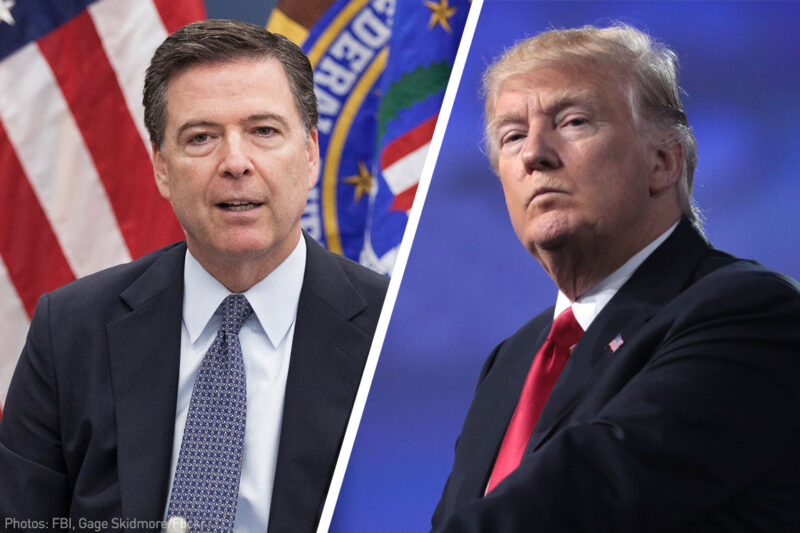
The ACLU today submitted a request to the Department of Justice and the FBI asking for the release of all documents relating to President Donald Trump’s decision to remove FBI Director James Comey from office. The cloud of uncertainty swirling over Comey’s dismissal, along with indications that the president may have gravely abused his power, demands a public accounting.
DEMAND A SPECIAL PROSECUTOR ON RUSSIA
At the time of his dismissal, FBI Director Comey was responsible for overseeing an ongoing investigation into Russian interference in the presidential election and possible collusion between Trump campaign officials and the Russian government. According to initial White House statements — by most accounts hastily assembled with little coordination — the president dismissed Comey on the recommendation of Attorney General Jeff Sessions and Deputy Attorney General Rod Rosenstein. The two, we learned, had prepared a pair of memoranda asserting that Comey had mishandled the investigation of Hillary Clinton’s private email server and had violated Department of Justice policies when he publicly announced the results of that investigation. (This, despite the fact that both Sessions and Trump had previously lauded Comey’s handling of that investigation.)
Subsequent reports indicate that the president had already decided to fire Comey — among other reasons, for being insufficiently loyal to the president — and that he sought the help of Sessions and Rosenstein to justify his decision. Several days after the dismissal, the president said in an interview that he fired Comey because “he’s a showboat, he’s a grandstander.” President Trump also stated that he had the Russia investigation in mind when he fired Mr. Comey, and media accounts indicate that Mr. Comey had requested additional resources for the FBI’s investigation in the days before he was dismissed. In other words, the White House’s explanations for firing Comey shifted significantly over a matter of days, and the public doesn’t know the actual basis for the decision.
As the nation’s predominant law enforcement agency, the FBI’s impact on American justice can’t be overstated. Our history offers important lessons into why the FBI director role needs to be insulated from political interference. In response to both Watergate and a litany of abuses wrought by J. Edgar Hoover’s five-decade tenure as FBI director, Congress established a 10-year term meant to both check the director’s power and insulate the position from party politics. The FBI plays a central role in defending the rule of law, conducting domestic law enforcement investigations, and protecting against civil rights and civil liberties violations. As a result, the agency has tremendous power to affect the lives of ordinary people — for good or ill. Its use of those powers should not be affected by political interests.
The president’s actions and shifting justifications threaten the rule of law. As both Trump and his deputy press secretary suggested, by firing Mr. Comey, Trump sought to hasten an end to the FBI’s ongoing investigation into his own campaign. But the rule of law requires that investigators and prosecutors have the independence to follow the facts wherever they lead — even if they lead to the president’s door. It is a firmly rooted tradition in our democracy that the president does not interfere with individual criminal investigations — let alone those that implicate the president’s own interests or the interests of his family, friends, or political associates.
To intervene in such an investigation, or to obstruct its progress, threatens to place the president above the law. It would subvert our system of justice, which requires the FBI and Department of Justice to hold even the most powerful to account. For these reasons, the ACLU has called for the appointment of a special prosecutor and the establishment of a select committee to investigate the Trump campaign’s ties to Russian interference. We have also called for the acting FBI director to permanently lead the Russia investigation. At this stage, this is the best way to ensure the investigation’s independence.
Meanwhile, we cannot afford to be kept in the dark on the president’s actual reasons for firing the FBI director.

